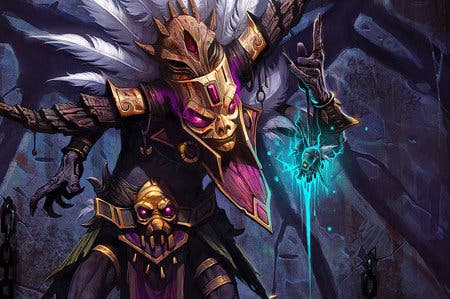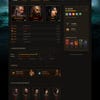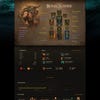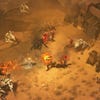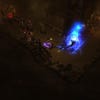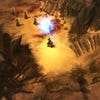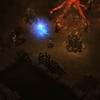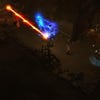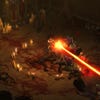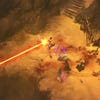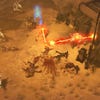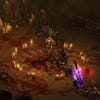Always Online: What Diablo 3's Battle.net Does Right
It's had a rough start - but Blizzard has put together a world-beating online service.
Diablo 3 is an online game. That's not an opinion, it's a fact - Blizzard requires you have an internet connection to play it, although previous Diablo games allowed offline play and many (most?) people enjoyed playing them solo. The controversy surrounding that decision has been intense, and so was fans' understandable frustration when server load made the game difficult to play on launch day this week.
There's a serious debate to be had about whether Blizzard's decision - made partly to combat piracy, partly to protect the security (and profitability) of its forthcoming real money trading system - was justifiable, and Always Online: What Diablo 3's Battle.net Does Wrong has a stab at it. But that debate would be an academic one. Always online Diablo 3 is the game we have. So what kind of compensation does that permanent internet connection offer you?
Happily, the answer is one of the most seamless and streamlined online services gaming has ever seen, combining fantastic utility and speed with unprecedented ease of use. The signs are that once servers have caught their breath and aggravating issues such as the missing achievements are resolved, it will be a very stable one, too. Diablo 3's custom-tailored Battle.net platform has the potential to be a new gold standard for online gaming.
Perhaps the first point to note, as it's the easiest to overlook, is that Diablo 3 effectively offers a secure "cloud saving" service that is only equalled by persistent online worlds such as Blizzard's own World of Warcraft. Those achievement troubles aside, it is simply impossible to lose progress in this game.
As my connection test on Tuesday showed, an internet dropout immediately freezes the game and eventually boots you back to the character select screen. You resume from your last checkpoint, but any character progress you made is saved. Subsequent testing reveals that as long as your connection comes back up within a generous 60-second window, the game can catch up and play is resumed (although, if you were in the middle of a tough scrap, you might be dead).
So every experience point, every item of loot and every coin of gold you earn is instantly logged to the servers and accessible from any computer that can download and run Diablo 3. One of Blizzard's more vague defences of Diablo 3's always online connection - put forward by design chief Rob Pardo last year when the decision was announced - is that your characters "feel more real" when they're persistent in this way, which leads to a more fun and rewarding game experience overall.
It's ephemeral stuff, to be sure, but in practice, the appeal is powerful. Once you start to explore your own and others' profiles, the prospect of having an offline Diablo 3 character begins to seem a bit like having a locally stored, private Facebook page.
Right-click on any player - in game, from your friends list, or from a list of players you've recently played with in public games - and you can view not just their achievements, basic stats and game progress, but models of all their characters, complete with skill and rune selections and all equipment pieces. Although the character models can't be customised, the variety of looks and builds is entrancing, and you quickly come to feel a collector's pride in your roster. Even if you only play solo and have a few friends, your online presence still feels meaningful. It's Gamerpoints and an Avatar, but far more fun.
Blizzard has a complete mastery of this stuff, having learned enough about persistence, motivation and player identity from WOW to fill an encyclopedia. Another neat touch is your banner, a cross-character identifier that can be customised from a huge range of unlocks to both look cool and reflect your progress in the game. In the four-player co-op, banners for each player appear at home base in each game, and clicking on one instantly warps you to that player's location.
The speed and ease with which you can join a friend in Diablo 3 is truly remarkable. Thanks to the banners and a feature called Quick Join, you're a literal two clicks from the character screen to standing next to your friend in-game. If a friend has the option enabled (and it's enabled by default), Quick Join puts their name on a button on the front end that warps you instantly to their game. Then click on their banner and you're in the fight. (If it's not enabled, there's a two-click option to request an invite from a friend, or a prominent button to invite them to your game.)
For seasoned players, it's easy to forget how intimidating and unfriendly online gaming can be. Flooded chat windows, server lists, game lists even - you'll find none of these in Diablo 3. Even joining a public game is just a matter of selecting the quest you want to play and hitting go. Like as not, you will be in one within seconds. You can make your own game public at any point with one click on the options menu. As friends or strangers jump in and out of a game, the difficulty scales dynamically and without a moment's pause to provide the right level of challenge for the party size.
It's all so, so easy. What's more, the fairly casual and fast-paced nature of Diablo 3 - co-op play requires a degree of team awareness but no advanced tactics beyond what you need to survive solo, on Normal difficulty at least - means there's next to no chance of getting shouted at, and little need for communication beyond the occasional "over here" or "OMG check this out". Griefing and loot-stealing are impossible. Simply put, the online service, game design and community present absolutely no barriers to enjoying the mute satisfaction of slaughtering monsters in company.
"There are public chat channels, including channels for trade and each class, but they're disabled by default, and hence very underpopulated at the moment."
There is another multiplayer game in Diablo 3, and it's one you can participate in even if you only want to play solo. It's trade, represented by the auction house (currently using game gold only, with the notorious real money version to be added soon). The philosophy of unthreatening simplicity prevails here, too.
Auctions are anonymous, saving no end of hassle, abuse and customer service issues, and it's a doddle to list items direct from your inventory with the buyout price of your choosing. Buying is even more of a pleasure, with the game automatically and rapidly listing items according to their suitability for your selected character.
Problems? Well, the two-tier friends system is a little confusing; you can friend someone either through their BattleTag (a Gamertag equivalent with an forgettable string of numbers attached to it) or, using Blizzard's Real ID system for real-life friends, an email address or Facebook connection. The Global Play system, which allows you to hop region servers from Europe to Asia or the Americas, is clunky and counter-intuitive - and while segregated characters are understandable, the lack of a common friends list is a shame. But at least the option is there.
Communication could be improved, too. The way text chat works will be very familiar to WOW players but could use some explaining for everyone else, and an in-game voice chat option would be a great addition. A mail system for messaging and trading with offline players would also be a boon.
Hopefully these and other improvements will be considered in time, but first, Blizzard has to implement two huge online features to Diablo 3: the currency auction house and the player-versus-player Arena system. As it stands, however, Diablo 3 on Battle.net is a already a great achievement.
The accessibility, speed and ease of use of every aspect of this online game are easy to take for granted, but you'll struggle to find them anywhere else. In terms of usability and friendliness, Battle.net is a match for Microsoft's standard-setting Xbox Live Gold subscription service, and its implementation here is as impressive as the 360's greatest online games - Halo 3 comes to mind - whilst being even quicker and simpler to operate.
I'm not sure there's ever been an online game that was so easy to enjoy. The requirement for a permanent internet connection might seem a heavy price, but Blizzard has at least had the good grace to make that connection feel valuable, with fun features and peerless execution that genuinely enrich the game. Yes, Diablo 3 is always online - and you'll always feel the benefit of that.
